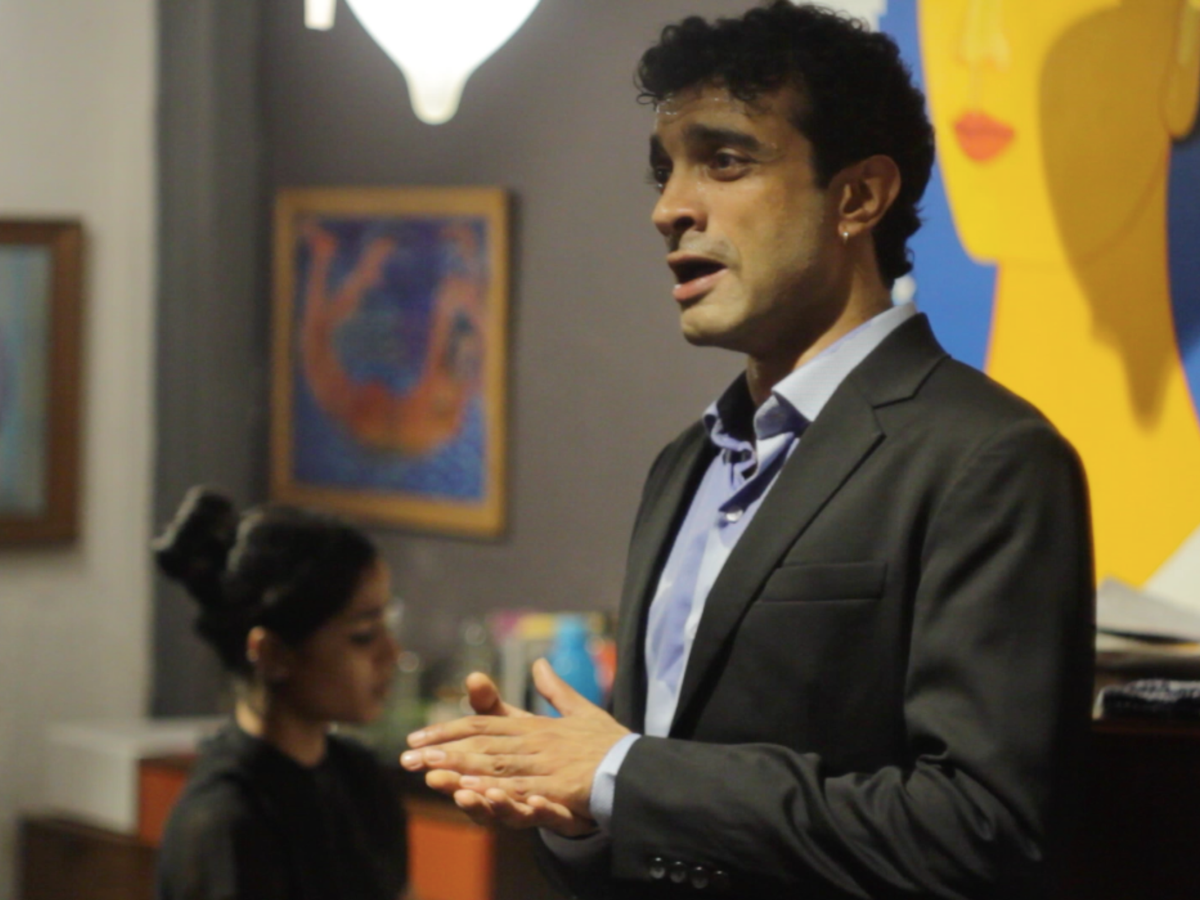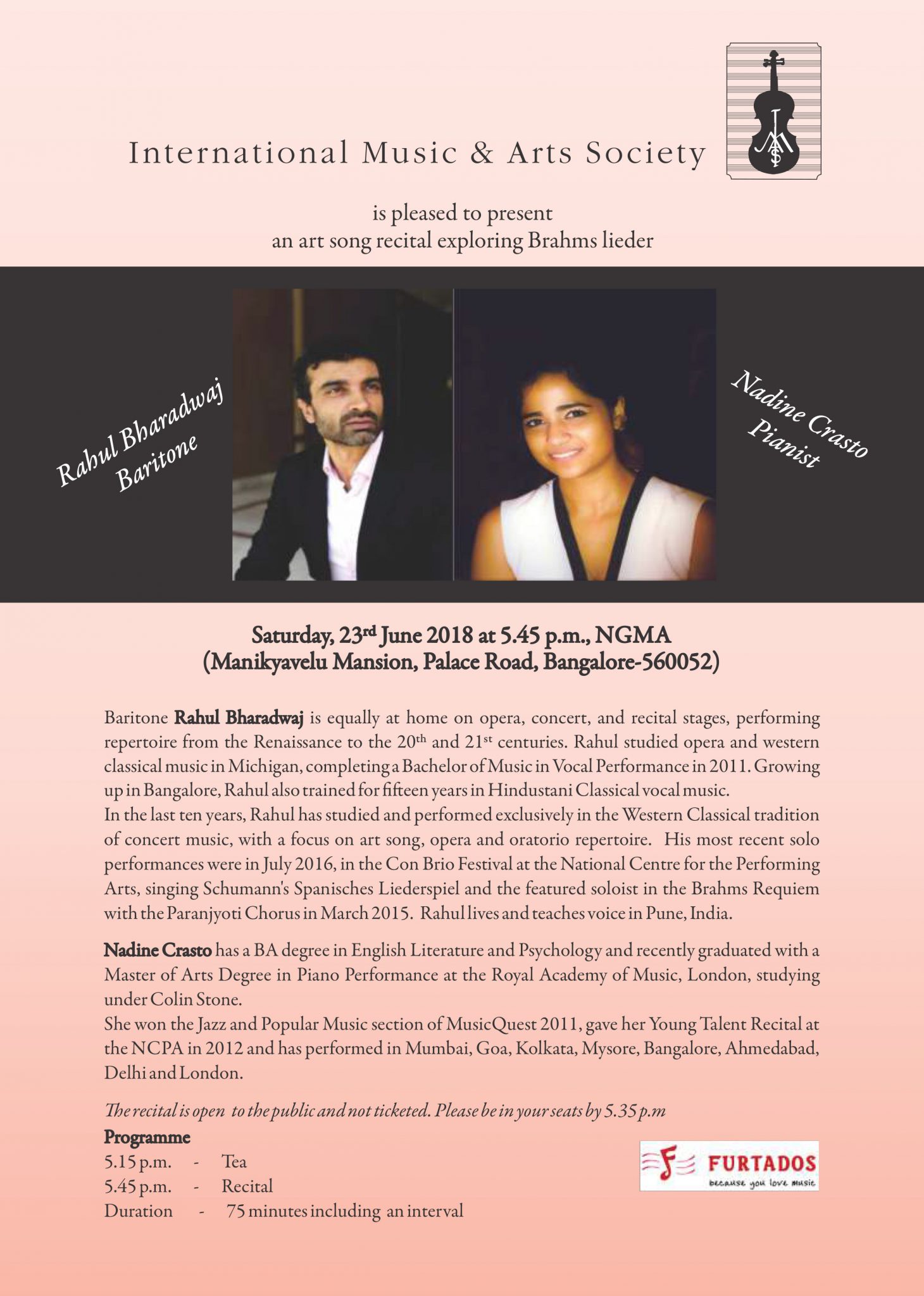AN ATTRACTIVE RECITAL OF GERMAN AND ENGLISH ART SONG

Brahms and Gerald Finzi at first glance make strange bed-fellows but this recital in Pune made it convincing. Baritone Rahul Bharadwaj has a brisk and confident personality eminently suited to the heavy Germanic nature of Brahms’ emotional music. His open-throated voice and forward diction made for an engaging beginning to this singer’s promising debut recital in his hometown of Pune. He now takes this excellent partnership with Mumbai pianist Nadine Crasto to Bangalore on 23rd of this month.
The evening began with Henry Purcell’s “If Music Be the Food of Love” and ended full-circle with Finzi’s 5 Shakespeare settings, the song-cycle “Let Us Garlands Bring”. This last for me was the perfect antidote to, in my opinion, a slight overdose of lush high–Romantic settings to less familiar German-language texts set by Brahms.
Following the very brief curtain-raiser were well-known Brahms settings in which the singer and pianist melded besutifully. If anything in their enthusiasm they were both guilty of over-emphasis rather than resorting to subtleties of expression to drive the point home. Sometimes it is better to let the music speak for itself rather than over-interpret in an attempt to convince. The most successful in this regard from the 9 lieder of Brahms before the interval were “Therese” with its quiet intimacy well captured, the soaring “Wie Melodien”, “Immer leiser” and the very familiar “Sapphische Ode”.
The singer and pianist returned to the platform visibly more relaxed after the interval. The voice was also more malleable and ingratiating after the demanding rigours of the first half. The second half started with four folk-inspired settings by Brahms. These impressed by their simplicity of appeal and clarity of texture. The Sandman with its tinkling right-hand accompaniment and the universally-loved Lullaby were memorable for the effective partnership of pianist and singer.
One can’t thank Rahul enough for introducing the wonderful Finzi cycle to Indian audiences. The rather more familiar Quilter Shakespeare settings were eschewed to successfully end this interesting and challenging recital.
Those of you reading this should make it a point to attend the concert in Bangalore presented by the International Music & Arts Society on 23rd June. Many thanks to the Poona Music Society for this presentation on 17th June.
I had the good fortune to hear from Rahul in his own words about his career and aspiration:
Fareed Curmally: What was it that attracted you to music in your childhood. You first studied Indian classical music but have made a career in the Western discipline. What drew you to both and what were the reasons for pursuing each at different stages of your career?
Rahul Bharadwaj: Growing up I was was exposed to mostly Hindustani, Jazz and Rock. I had an opportunity to take Hindustani classical as an elective at school and I sang lead vocals for rock bands. I had little exposure to concert music other than piano lessons for Trinity Grades. Watching Pt. Kumar Gandharva at close quarters, in a “baithak” was when I had a foundational moment about the notion of performance and especially vocals, thus creating a transformative or moving experience in myself. I went on to pursue it and explored both the “gurukul” system as well as a more formal bachelor’s degree in Mumbai. But while I loved the music I think I was too young to accept the rituals surrounding the practice. It was only many years later, after trying a variety of music-related work, that I had another opportunity to study, and because it was in the U.S., I applied for a degree in Western classical vocal performance. I’m amazed they accepted me on an audition tape of Simon and Garfunkel and some khayal performances! I went with a faint knowledge of this genre. In the course of my education I became immersed in a vast body of music that was both challenging and exhilarating.
What draws me to this genre is the way intention plays itself out in performance. The singer’s job is to deliver on the composer’s intention. Each time I approach a work the juice is in discovering the nuances and devices that are available for intepretation within the prescribed socio-cultural and idiomatic frameworks that locate the music. Coming from training in an oral tradition, I found something pre-composed is inherently more open to critique than something improvisational. Over a decade of this study what calls me today is using these devices to make the synthesis of words and music, greater than the sum of its parts.
FC: Does singing the two different traditions require two different techniques; what are they and is it possible to continue performing both simultaneously?
RB: I don’t know if they do require different techniques, but historical performance practices have developed along different aesthetics. It is not a binary circumstance and there is a diversity of pedagogy in both genres. The Western aesthetic has a lot to do with vocal impact without amplification and the efficiency of vocal production required to do that. As a result most vocal training (i.e. technical and muscular training) revolves around honing that instrument, in this case the human body. As I understand the Hindustani aesthetic, the focus is largely introspective, with the audience as witness to the relationship between the singer and the spirit/muse. The training is likely to be raag-dhari (mode-based) and/or shabd-dhari (word-based).
I really don’t know if its possible to perform in both genres. I can’t imagine doing that much work myself. I think we disregard the amount of constant study that performance takes.
FC: How many languages are you fluent in and how important do you think knowing languages is for accurate interpretation?
RB: I have a working knowledge of German and Italian. My French is quite bad and I’m always working at all of them. Facility with language is vital and fundamental to this art form.
FC: You say you are equally comfortable in recital, opera and in concert/oratorio. Do you have any personal preference of repertoire you would like to perform more of?
RB: I’d love to perform more oratorio and lieder and contemporary music is always exciting.
FC: How do you see your career develop in the long run? What is the future for young singers like yourself in this country? How would you like to see infrastructure develop to include singing-actors of Indian origin?
RB: Honestly, I’d have to go abroad to have this be a viable livelihood. Who knows though? There is much more going on here now than even 8 years ago when I returned to India. Much credit goes to organizations like GVS (Giving Voice Society) Poona Music Society, Neemrana Foundation, the NCPA and various Music societies along with committed teachers.
Currently the good teachers are spread thin and infrastructure that funds teaching and developing a generation of high-quality musicians, would go a long way. Funding and taking risks with performance opportunities that don’t fit established norms is crucial to creating a vital audience that can breathe life into the next generation of singing-actors.





